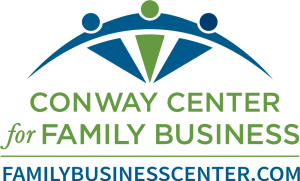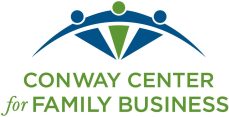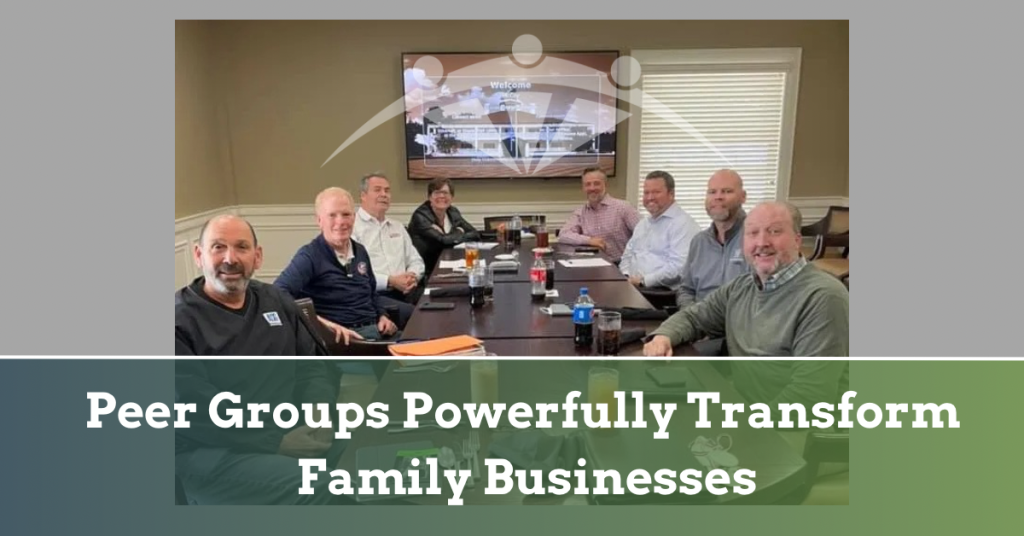Peer groups provide an environment where leaders can confidentially connect with others who understand the intricacies of managing both business and family dynamics, making the groups an essential resource in moving their business forward. Indeed, in 2000 when Chris Converse first began working for his family’s Grove City business Converse Electric, he began attending monthly educational programs at the Conway Center for Family Business with his father Jerry to learn the intricacies involved with running a family business.
Chris now represents the third generation of his family serving as president of Converse Electric. He leads 75 employees and hopes to include fourth-generation family members in the near future, continuing the legacy.
When it became clear that Chris would one day take over the business, he realized there was a need for additional support because, “I was so young, I didn’t know what I didn’t know.”
He found that support in the Conway Center’s CEO peer group and professional development programs available through the Center. “What struck me when I first attended meetings was that prominent businesspeople were willing to talk about mistakes they have made or how their businesses were going,” Converse said. “It was incredible to know that they were willing to be vulnerable, to share and learn from each other.”
Why family business leaders join peer groups
Family businesses have unique challenges that often differ significantly from those faced by non-family-run enterprises.
For family business leaders, participation in peer groups offers a valuable opportunity to navigate these challenges, gain new perspectives and help ensure the longevity of their business.
“Peer groups are the heartbeat of our organization. Each month, our peer group members learn from each other and dive into important family business issues,” said Jill Hofmans, executive director, Conway Center. “Peer groups benefit both businesses and families. Leaders share their hopes and dreams and get strategic business advice from others have ‘been there, done that.’”
Benefits of participating in peer groups
There are many benefits available to family business leaders who actively commit to engaging with their peers, including a deeper understanding of themselves, their concerns and their needs.
Emily Chapman, a third-generation family member at Integrated Building Systems, jumped into the Next Generation Leaders peer group within weeks of joining her family’s Columbus-based company. “I found a supportive community of peers and a safe place to discuss challenges and what’s needed to be successful in a family business,” Chapman explained. “The peer group is a place to get ideas and to learn about things you may never even have thought of before.”
Peer groups can help leaders:
- Navigate family dynamics. A significant challenge in family businesses is managing the overlap between family relationships and business operations. Peer groups allow leaders to discuss sensitive issues such as interpersonal conflicts in a setting uniquely tailored to family businesses.
“I found our next-gen group often talks about issues related to family topics as much as we discuss business operations,” Chapman explained. “It’s helpful to work though complicated family dynamics with others experiencing similar situations.”
- Share best practices. Exchanging knowledge can lead to the discovery of best practices that might not be apparent in a non-family business context. Leaders also can test and validate new ideas in a safe environment.
For example, groups may discuss governance structures that work well in a family business, such as family councils or advisory boards.
- Gain emotional support. Being a family business leader can feel isolating. Leaders can receive support from those who understand the pressures they face in balancing family and business, which can support solid decision-making.
- Promote accountability and personal growth. Participating in a peer group introduces a level of accountability that can be highly motivating. It also can help leaders overcome inertia they may be experiencing in their business.
“As a business owner, I value being challenged by people I respect and also challenging them,” Converse said. “When you’re in a team setting, it’s not about artificial harmony, it’s about being frank and constructive. I love that.”
Conway Center Peer Groups
The Center’s ten programs range from CEO and rising CEO groups to next-generation leaders and Women in Family Business. Each group is right-sized to optimize interaction and includes participants with diverse backgrounds and experiences.
“I appreciate receiving honest feedback from peers who are not family members,” Chapman said. “It provides perspectives which can reinforce what you believe or challenge you to think in new ways.”
 Learn more at Conway Center. For information about joining the Center and other educational, recognition or networking opportunities, visit familybusinesscenter.com.
Learn more at Conway Center. For information about joining the Center and other educational, recognition or networking opportunities, visit familybusinesscenter.com.

